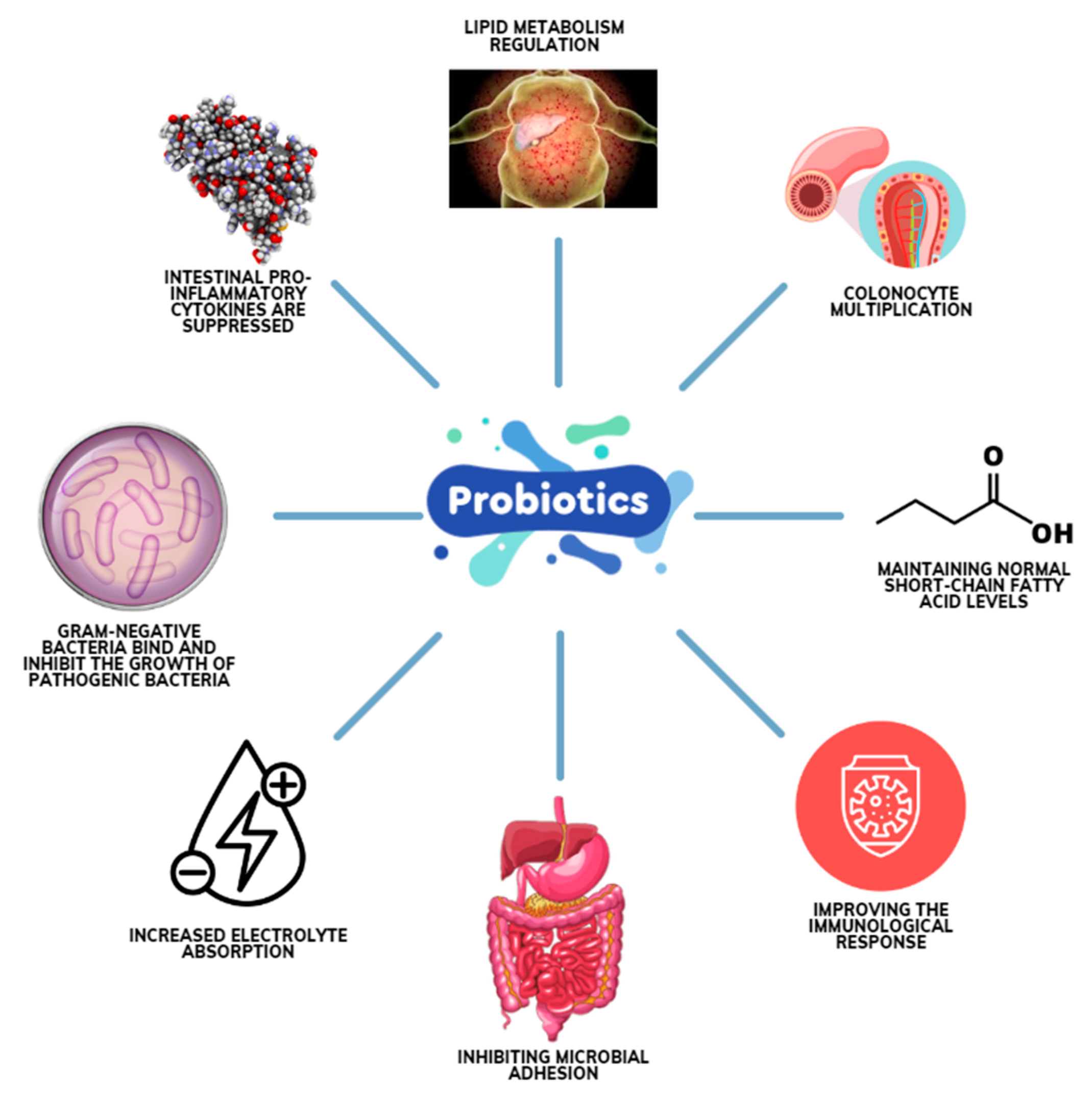Probiotics can improve gut health, support digestion, and aid in weight management. Specific strains offer distinct benefits.
Probiotics are live microorganisms that provide numerous health benefits when consumed in adequate amounts. They play a crucial role in maintaining gut health by balancing the gut microbiome, which is essential for proper digestion and nutrient absorption. Probiotic strains like Lactobacillus acidophilus and Bifidobacterium bifidum are particularly effective.
Lactobacillus acidophilus helps reduce bloating and supports nutrient absorption. Bifidobacterium bifidum aids in breaking down complex carbohydrates and fibers, easing digestion. These strains also contribute to weight management by regulating appetite and boosting metabolism. Including probiotics in your diet can lead to a healthier gut, better digestion, and effective weight control.

Credit: www.mdpi.com
Introduction To Probiotics
Probiotics are live microorganisms that benefit your health, especially your gut. These friendly bacteria help balance the gut flora and improve digestion. They also support immune function and aid in weight management.
What Are Probiotics?
Probiotics are beneficial bacteria found in various foods and supplements. They live in your digestive system and help keep it healthy. They fight off harmful bacteria and aid in nutrient absorption.
Common sources of probiotics include:
- Yogurt
- Kefir
- Sauerkraut
- Kimchi
- Miso
Probiotic supplements are also available in capsule, tablet, and powder forms. They contain different strains of bacteria, each offering specific health benefits.
History And Origins
The concept of probiotics dates back to ancient times. Fermented foods, rich in probiotics, were staples in many cultures. These foods were used for their health benefits long before the term "probiotics" existed.
In the early 20th century, a Russian scientist, Elie Metchnikoff, proposed the idea of beneficial bacteria. He suggested that consuming these bacteria could improve health and longevity. His research laid the groundwork for modern probiotic science.
Probiotics gained popularity in the late 20th century. Scientists discovered specific strains of bacteria that offered targeted health benefits. Today, probiotics are a key component of gut health and overall well-being.
Here are some well-known probiotic strains and their benefits
Understanding the history and origins of probiotics helps appreciate their importance. Adding probiotics to your diet can significantly improve your gut health.

Credit: www.amazon.com
Gut Health Benefits
Probiotics offer many benefits for gut health. They help maintain a balanced microbiome, support digestion, and assist in weight management. Specific probiotic strains can target different health issues effectively.
Microbiome Balance
The gut is home to trillions of bacteria. A balanced microbiome is crucial for overall health. Probiotic strains like Lactobacillus acidophilus and Bifidobacterium bifidum help maintain this balance. They increase the good bacteria and reduce harmful bacteria.
- Lactobacillus acidophilus: Reduces bad bacteria, boosts nutrient absorption.
- Bifidobacterium bifidum: Enhances gut flora, supports bowel regularity.
Boosting Immunity
Probiotics also play a role in boosting immunity. A healthy gut can fend off infections better. Strains like Lactobacillus rhamnosus and Bifidobacterium longum are effective in this regard.
- Lactobacillus rhamnosus: Strengthens immune response, reduces respiratory infections.
- Bifidobacterium longum: Supports the immune system, reduces inflammation.
Digestive Health
Maintaining good digestive health is crucial for overall well-being. A healthy gut can enhance nutrient absorption, support immunity, and even improve mood. Probiotics, which are beneficial bacteria, play a key role in promoting digestive health. By introducing specific probiotic strains into your diet, you can experience significant improvements in various digestive issues.
Enhancing Digestion
Probiotics can significantly enhance digestion. They help break down food, making nutrients more accessible. Some specific strains like Lactobacillus acidophilus and Bifidobacterium lactis are well-known for their digestive benefits.
- Lactobacillus acidophilus: This strain helps break down lactose, aiding those with lactose intolerance.
- Bifidobacterium lactis: This strain supports the digestion of fibers and promotes regular bowel movements.
Reducing Bloating
Many people suffer from bloating, which can be uncomfortable and embarrassing. Probiotics like Lactobacillus plantarum and Bifidobacterium infantis can help reduce bloating.
- Lactobacillus plantarum: This strain helps reduce gas formation, decreasing bloating.
- Bifidobacterium infantis: This strain has been shown to improve symptoms of irritable bowel syndrome (IBS), including bloating.
Weight Loss Support
Probiotics can play a crucial role in supporting weight loss. Certain probiotic strains help boost metabolism and reduce fat absorption. This section explores how these probiotics work to support weight management.
Metabolism Boost
Probiotics like Lactobacillus gasseri can increase your metabolism. A higher metabolism means you burn more calories even at rest. This can support weight loss efforts effectively. Studies show that people taking Lactobacillus gasseri lost more belly fat.
Another helpful strain is Bifidobacterium breve. It helps improve metabolism by enhancing the breakdown of fats and carbohydrates. This process leads to better energy utilization.
Fat Absorption Reduction
Lactobacillus rhamnosus is known to reduce fat absorption. This probiotic strain limits the amount of dietary fat your body absorbs. Less fat absorption means fewer calories stored as fat.
Another effective strain is Bifidobacterium lactis. This strain helps reduce fat storage by promoting a healthy gut environment. A balanced gut means better digestion and less fat accumulation.
Popular Probiotic Strains
Probiotics are beneficial bacteria that support gut health. Different strains offer unique benefits. This section explores two popular probiotic strains: Lactobacillus and Bifidobacterium.
Lactobacillus
Lactobacillus is a common probiotic strain. It helps balance the gut microbiome.
- Lactobacillus acidophilus: Aids in lactose digestion and reduces IBS symptoms.
- Lactobacillus rhamnosus: Supports immune health and reduces diarrhea.
- Lactobacillus plantarum: Reduces bloating and enhances nutrient absorption.
Bifidobacterium
Bifidobacterium strains are essential for maintaining a healthy gut. They improve digestion and support overall well-being.
- Bifidobacterium bifidum: Reduces symptoms of IBS and boosts immune function.
- Bifidobacterium longum: Alleviates constipation and improves lactose tolerance.
- Bifidobacterium breve: Supports skin health and reduces inflammation.
Probiotic-rich Foods
Probiotic-rich foods are essential for improving gut health. They support digestion and aid in weight management. Consuming these foods regularly can introduce beneficial bacteria into your system. This helps maintain a balanced gut microbiome. Let's explore some of the best probiotic-rich foods.
Yogurt And Kefir
Yogurt is one of the most popular probiotic-rich foods. It contains live cultures like Lactobacillus and Bifidobacterium. These strains help improve digestion and boost the immune system. Yogurt also provides calcium, protein, and vitamins.
Kefir is another excellent source of probiotics. It's a fermented milk drink with a tangy taste. Kefir contains a wider variety of bacteria and yeasts compared to yogurt. This makes it even more potent in supporting gut health. Both yogurt and kefir are versatile and can be added to smoothies, cereals, or enjoyed on their own.
Fermented Vegetables
Fermented vegetables are rich in probiotics and nutrients. They include foods like kimchi, sauerkraut, and pickles. These foods are packed with beneficial bacteria that aid digestion and enhance gut health
These fermented veggies are easy to add to meals. They pair well with sandwiches, salads, and main dishes. Eating them regularly can significantly improve your gut health.
Choosing The Right Supplement
Choosing the right probiotic supplement is essential for gut health, digestion, and weight management. Not all probiotics are the same. Some strains serve specific purposes. Knowing how to select the best one is crucial.
Reading Labels
Always read the labels carefully. Look for the CFU count (colony-forming units). This number indicates the number of active bacteria per dose.
Check for the strain names. Strain-specific benefits are important. For example:
- Lactobacillus acidophilus - Supports digestion
- Bifidobacterium lactis - Enhances immune function
- Lactobacillus gasseri - Aids in weight management
Look for added ingredients. Avoid supplements with unnecessary fillers or artificial additives.
Dosage Recommendations
Follow dosage recommendations on the label. Usually, supplements suggest one or two capsules per day.
Some strains require higher doses. For example, Lactobacillus rhamnosus may need up to 20 billion CFUs daily for effectiveness.
Consult with a healthcare provider. They can offer personalized advice based on individual health needs.
| Probiotic Strain | Recommended Daily Dosage | Primary Benefit |
|---|---|---|
| Lactobacillus acidophilus | 1-10 billion CFUs | Supports digestion |
| Bifidobacterium lactis | 5-10 billion CFUs | Enhances immune function |
| Lactobacillus gasseri | 10-20 billion CFUs | Aids in weight management |

Credit: www.amazon.com
Potential Side Effects
Probiotics offer many benefits, but they can cause side effects. Understanding these side effects helps make informed decisions. In this section, explore common reactions and who should avoid probiotics.
Common Reactions
Most people tolerate probiotics well. Some may experience mild side effects. Here are common reactions:
- Gas and Bloating: Many people report gas and bloating. This usually occurs when starting probiotics.
- Diarrhea: Probiotics can change gut bacteria. This might lead to diarrhea for a short period.
- Abdominal Pain: Some people feel minor abdominal pain. This often resolves after a few days.
These side effects are generally mild and short-lived. They often go away as the body adjusts to the probiotics.
Who Should Avoid Probiotics
While probiotics are safe for most, some should avoid them. Here’s a list of groups who should be cautious:
Always consult with a healthcare provider before starting probiotics. This ensures safety and effectiveness for your specific needs.
Incorporating Probiotics Into Daily Life
Incorporating probiotics into your daily routine is easier than you think. These beneficial bacteria can improve gut health, support digestion, and help manage weight. Let's dive into dietary tips and lifestyle changes to make probiotics a part of your everyday life.
Dietary Tips
Adding probiotics to your diet can be simple and enjoyable. Here are some tips:
- Eat yogurt: Choose plain, unsweetened yogurt with live cultures.
- Try kefir: This fermented milk drink is rich in probiotics.
- Include sauerkraut: Fermented cabbage is a tasty source of probiotics.
- Enjoy kimchi: This spicy Korean dish is packed with beneficial bacteria.
- Snack on pickles: Choose naturally fermented pickles for a probiotic boost.
Specific probiotic strains to look for include Lactobacillus acidophilus and Bifidobacterium bifidum. These strains help with digestion and support a healthy gut.
Lifestyle Changes
Making small lifestyle changes can also support your gut health. Here are some ideas:
- Stay hydrated: Drink plenty of water to keep your digestive system moving.
- Exercise regularly: Physical activity promotes healthy digestion.
- Get enough sleep: A good night's sleep supports overall health.
- Manage stress: Stress can negatively impact gut health.
- Avoid unnecessary antibiotics: Use antibiotics only when needed.
Incorporating these habits into your daily life can enhance the benefits of probiotics. A healthy lifestyle supports a healthy gut.
Future Of Probiotics
The future of probiotics is incredibly exciting. Research continues to uncover new benefits. Scientists are discovering innovative ways to use these beneficial bacteria. Let's explore the latest findings and products that are shaping this field.
Emerging Research
Emerging research is shedding light on the many benefits of probiotics. Studies show they can improve gut health, support digestion, and aid in weight management.
- Lactobacillus rhamnosus: Helps reduce belly fat and supports weight loss.
- Bifidobacterium lactis: Boosts immune function and improves digestion.
- Lactobacillus acidophilus: Enhances nutrient absorption and maintains a healthy gut flora.
Researchers are also exploring how probiotics affect mental health. Some studies suggest they can reduce stress and improve mood.
Innovative Products
New products are making probiotics more accessible and effective. These include:
- Probiotic Supplements: These are easy to take and come in various forms, like capsules and powders.
- Probiotic Foods: Foods like yogurt, kefir, and kimchi are rich in beneficial bacteria.
- Synbiotics: These combine probiotics and prebiotics to enhance gut health.
Manufacturers are also developing targeted probiotic strains. These strains aim to address specific health concerns, such as weight management or immune support.
The future of probiotics holds great promise. Ongoing research and innovative products will continue to unlock new benefits.
Frequently Asked Questions
How Do Probiotics Improve Gut Health?
Probiotics improve gut health by balancing gut bacteria, aiding digestion, enhancing immune function, and reducing inflammation. They support nutrient absorption and prevent harmful bacteria overgrowth.
How Do Probiotics Help In Digestion?
Probiotics help digestion by balancing gut bacteria, improving nutrient absorption, and reducing digestive issues like bloating and constipation.
What Is The Role Of Probiotics In Maintaining Gut Health?
Probiotics help maintain gut health by balancing gut bacteria, improving digestion, and boosting the immune system. They prevent harmful bacteria growth and support nutrient absorption.
What Do Probiotics And Prebiotics Support By Supporting Your Gut Health?
Probiotics and prebiotics support digestive health. They enhance nutrient absorption, boost the immune system, and balance gut bacteria.
Conclusion
Probiotics offer powerful benefits for gut health, digestion, and weight management. Incorporate specific strains like Lactobacillus and Bifidobacterium. Improve your overall well-being by including these beneficial bacteria in your daily routine. Remember, a healthy gut is key to a healthier you.
Embrace probiotics for a better digestive health journey.






.png)



0 Comments